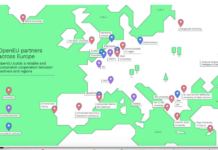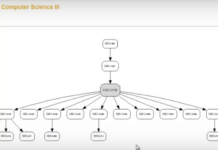The latest edition of the Australian-based journal, ‘Distance Education’, Vol. 30, No. 2, is devoted entirely to research on learning design.
As the editorial by Sue Bennett, Shirley Agosthino, Lori Lockyer and Barry Harper, all of the University of Wollongong, points out:
‘While long recognised by institutions that have had a history of participation in distance education, for many universities the notion of educational design as an important part of an academic’s routine activities is a relatively new one’. (p.175)…
All learning design processes are based on the assumption that learning and teaching experiences must be systematically described using an appropriate formalism to make apparent critical features. The intention is that high-quality designs, if described in such a way, can be adapted and customised by another teacher to suit his or her context.’
The journal contains five research papers on learning design, plus a review of a book on learning design, as follows:
Donald, C. et al. (2009) Approaches to learning design Distance Education, Vol 30, No. 2, pp. 179-200
Griffiths, D. et al. (2009) From Reload to ReCourse: learning from IMS Learning Design implementations Distance Education, Vol 30, No. 2, pp. 201 – 222
Masterman, E. et al. (2009) Capturing teachers’ experience of learning design through case studies Distance Education, Vol 30, No. 2, pp. 223-238
Alvino, S. et al. (2009) Supporting the re-use of of effective CSCL learning designs through social structure representations Distance Education, Vol 30, No. 2, pp. 239-258
Miao, Y. et al. (2009) Enabling teachers to develop pedagogically sound and technically executable learning designs Distance Education, Vol 30, No. 2, pp. 259-276
Book review: Lockyer, L. et al. (2008) Handbook of research on learning design and learning objects: issues, applications and technologies Hershey PA: Information Science Reference, 890 pp, reviewed by Michael Derntl, University of Vienna.
Unfortunately, Distance Education still requires a subscription, and the articles therefore are not available over the web.
Personal comments
If you have heard people discussing learning design, and wanted to know what it is about, this journal edition would be a good place to start.
More of an issue for me is the value of the current approaches to learning design. Although I support completely the idea that good teaching should be informed by principles of good design, the focus of learning design research on trying to provide computer correlates or ‘objective, reproducible descriptions’ of learning design seems to me to be a dead end, in exactly the same way that the research in the 1980s on artificial intelligence and learning design came to a dead end.
In many ways, the current research on learning design is an outcome of the failure of research on the computerization of learning objects to produce practical, applicable tools that can be used by teachers. Reading these articles I was struck by how restricted computers are in representing the complexity of human learning and teaching, and how ‘forced’ or restricted the solutions proposed appear to be. I am also once again enraged by the hi-jacking of everyday language (‘learning design’) by essentially computer scientists to mean something very specific and different from common usage.
The current approach to learning design may well prove me wrong, but I would like to see a more critical and thoughtful approach to the underlying philosophical assumptions behind this approach than what I found in these articles. In the meantime, let’s see more research on what constitutes good design in teaching and learning, and how different technologies can enable, facilitate or enhance good design, but let’s not get bogged down in one way of looking at this issue.
BC Educational Technology Users’ Group Workshop on learning design
This is purely co-incidental, but this seems a good point to mention the next ETUG workshop, which happens to be on – learning design.









 Dr. Tony Bates is the author of eleven books in the field of online learning and distance education. He has provided consulting services specializing in training in the planning and management of online learning and distance education, working with over 40 organizations in 25 countries. Tony is a Research Associate with Contact North | Contact Nord, Ontario’s Distance Education & Training Network.
Dr. Tony Bates is the author of eleven books in the field of online learning and distance education. He has provided consulting services specializing in training in the planning and management of online learning and distance education, working with over 40 organizations in 25 countries. Tony is a Research Associate with Contact North | Contact Nord, Ontario’s Distance Education & Training Network.

